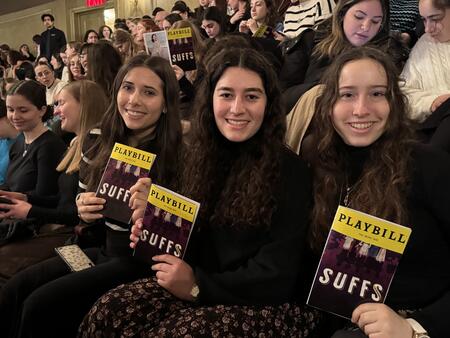Just days after Suffs arrived on Broadway last month, 110 students from the S. Daniel Abraham Honors Program at Stern College for Women attended an evening performance. The stunning musical, with an all-female cast, focuses on a historical group of brave and determined suffragists, “Suffs” as they called themselves, and their relentless pursuit of the right to vote in the seven years leading up to the passage of the 19th Amendment in 1920.
At the start of the show, the audience is introduced through a series of rousing and highly entertaining songs to the group of women. One of them is Alice Paul, who wants to organize a suffragist march in Washington D.C. to take place the day before Woodrow Wilson will be inaugurated in 1913. She is ultimately joined in this effort by Lucy Burns, Inez Milholland, Doris Stevens, and Ruza Wenclawska. However, Carrie Catt, another famed historical figure, clashes with Alice Paul as she is skeptical of their plans, and feels a quieter, more “ladylike” approach would be more effective. As the show unfolds, there also emerges a parallel storyline featuring Ida B. Wells, an indefatigable African-American woman working to achieve equal rights by demanding that black suffragists be allowed to march alongside their white counterparts.
The suffragists face many challenges before achieving the right to vote, including from President Wilson, who is portrayed as a villain due to his unwillingness to listen to the women and consider their point of view. In contrast, his chief advisor, Dudley Malone, is greatly impressed, and one of the highlights of the show is a delightfully witty duet, in which Doris Stevens describes for him the legal ramifications of marriage from a woman’s point of view.
As it becomes clear that President Wilson will not help them, the women run a campaign to vote him out of office in 1916. Nonetheless, he is elected for another term. The women are distraught but choose to persevere. They picket in front of the White House, are jailed, and start a hunger strike. After two years of setbacks and progress, the voting rights amendment finally becomes law after Tennessee passes it with a 1-vote majority (the outcome hinges on a Tennessee state congressman changing his vote after receiving a gently chiding letter from his mother).
The women celebrate, but for African-American women, the fight is far from over.
The show won high praise from the honors students for the entertaining way in which it presents the historic fight for equality that crossed generational, racial and class divides.
Many thanks to Vered Gottlieb ‘26S for her help with the writing of this article.


